Nicholas Goda
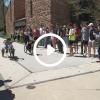 CU Boulder engineering students designed, built and tested drill-powered vehicles as part of a capstone project, which culminated in a day of friendly competition to test their vehicles. Watch the video.
CU Boulder engineering students designed, built and tested drill-powered vehicles as part of a capstone project, which culminated in a day of friendly competition to test their vehicles. Watch the video.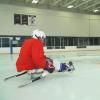 Members of the U.S. National Sled Hockey Team are working with CU researchers on a project that could ultimately improve performance and reduce injury for hockey players with lower-limb amputations or impairments.
Members of the U.S. National Sled Hockey Team are working with CU researchers on a project that could ultimately improve performance and reduce injury for hockey players with lower-limb amputations or impairments. The College of Music’s Thompson Jazz Studies Program will be shaking up this year’s commencement ceremony with new takes on the timeless “Pomp and Circumstance,” reimagined in the styles of Latin jazz, New Orleans funk and big band swing.
The College of Music’s Thompson Jazz Studies Program will be shaking up this year’s commencement ceremony with new takes on the timeless “Pomp and Circumstance,” reimagined in the styles of Latin jazz, New Orleans funk and big band swing.
 Mountain chickadees have among the best spatial memory in the animal kingdom. New research identifies the genes at play and offers insight into how a shifting climate may impact the evolution of their memory skills.
Mountain chickadees have among the best spatial memory in the animal kingdom. New research identifies the genes at play and offers insight into how a shifting climate may impact the evolution of their memory skills.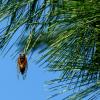 This summer in 15 states across the Southeast and Midwest, two cicada broods will emerge simultaneously for the first time since 1803. CU Boulder’s Sammy Ramsey offers insight on these singing, red-eyed bugs and how they benefit the planet.
This summer in 15 states across the Southeast and Midwest, two cicada broods will emerge simultaneously for the first time since 1803. CU Boulder’s Sammy Ramsey offers insight on these singing, red-eyed bugs and how they benefit the planet.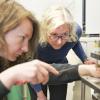 Armed with up to $39 million in federal funding, a dream team of researchers from three Colorado campuses aims to end osteoarthritis.
Armed with up to $39 million in federal funding, a dream team of researchers from three Colorado campuses aims to end osteoarthritis.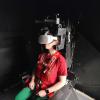 In amusement park-like experiments on campus, aerospace engineers at CU Boulder are spinning, shaking and rocking people to study the disorientation and nausea that come from traveling from Earth to space and back again.
In amusement park-like experiments on campus, aerospace engineers at CU Boulder are spinning, shaking and rocking people to study the disorientation and nausea that come from traveling from Earth to space and back again.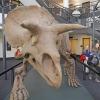 A new, full-scale skeleton of a Triceratops dinosaur has arrived on campus, shining a light on Colorado’s ancient past—a time when creatures like this three-horned dinosaur tromped through landscapes with palm trees, and flying reptiles with 20-foot wingspans called pterosaurs soared through the sky.
A new, full-scale skeleton of a Triceratops dinosaur has arrived on campus, shining a light on Colorado’s ancient past—a time when creatures like this three-horned dinosaur tromped through landscapes with palm trees, and flying reptiles with 20-foot wingspans called pterosaurs soared through the sky.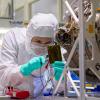 Scientists and engineers at the CU Boulder will soon take part in an effort to collect a bit of stardust—the tiny bits of matter that flow through the Milky Way Galaxy and were once the initial building blocks of our solar system.
Scientists and engineers at the CU Boulder will soon take part in an effort to collect a bit of stardust—the tiny bits of matter that flow through the Milky Way Galaxy and were once the initial building blocks of our solar system. The brain produces more of the pleasure-inducing hormone dopamine when we’re longing for or hanging out with our partner, according to research by CU Boulder neuroscientists. But when we break up, that unique “chemical imprint” fades away.
The brain produces more of the pleasure-inducing hormone dopamine when we’re longing for or hanging out with our partner, according to research by CU Boulder neuroscientists. But when we break up, that unique “chemical imprint” fades away.


